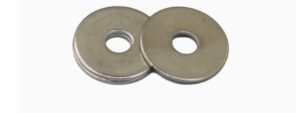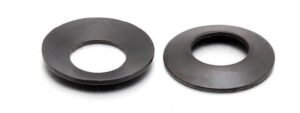Having been in the fastener industry for 15 years and being a Fastener Specialist at Hengrui, I have seen a lot of screws. And let me tell you, not all screws are created equal. This article is going to help you navigate the world of screws and understand which type is best for your project. Are you ready to become a screw expert? Let’s go!
1. Wood Screws
Wood screws are the most common type of screw you’ll encounter. They’re specifically designed for wood applications, featuring a sharp point and coarse threads that grab onto wood fibers tightly.

These screws come in a variety of diameters and lengths. The head styles vary as well, including flat, round, and oval. The type of head you use depends on the finish you desire. For example, flat heads can be countersunk to sit flush with the wood surface, giving you a clean look. These screws are generally steel, brass, or stainless steel.
2. Machine Screws
Machine screws are used in metalworking and mechanical applications. Unlike wood screws, machine screws require a pre-threaded hole or a nut to fasten materials together. They come in various sizes, from teeny tiny screws used in electronics to giant ones used in massive pieces of equipment.

The threading on machine screws is much finer than wood screws. This finer threading allows them to bite securely into metal and other hard materials. Plus, there are different head types, including flat, pan, and hex heads, each serving a unique purpose. Typically made from steel, stainless steel, or brass.
3. Self-Drilling Screws
Self-drilling screws, often referred to as TEK® screws, have a drill bit-like point that allows them to cut through materials without needing a pre-drilled hole. This makes them incredibly efficient for quick assembly.

These screws are typically used in metal-to-metal or metal-to-wood applications. Their ability to drill and fasten in one step saves time and effort, especially in large-scale projects. Typically made from hardened steel or stainless steel.
4. Lag Screws
Lag screws, or lag bolts, are heavy-duty fasteners typically used in wood construction. They’re larger and stronger than wood screws, making them ideal for tasks requiring a secure and robust connection, such as fastening heavy timbers.

You’ll need to pre-drill a pilot hole for lag screws due to their size and threading. They come with hex heads, which allow for higher torque application using a wrench or socket driver. Typically made from steel, often galvanized for corrosion resistance.
5. Drywall Screws
Drywall screws are specifically designed for installing drywall sheets to wooden or metal studs. They have a bugle-shaped head that helps to prevent tearing the drywall paper surface.

These screws feature a phosphate coating to reduce friction and a sharp point to easily penetrate drywall. They’re available in coarse and fine threads, with coarse being ideal for wood studs and fine for metal studs. Typically made from steel, often with a phosphate coating.
6. Chipboard Screws
Chipboard screws are specifically designed for use in particleboard and other composite materials. They have a thin shank and a coarse thread that allows them to cut through the soft material without splitting it.

These screws often have a self-tapping feature, reducing the need for pre-drilling. They come with different head styles, including flat and countersunk heads, which help in achieving a flush finish on the surface. Typically made from steel, often zinc-plated.
7. Self-Tapping Screws
Self-tapping screws are similar to self-drilling screws but without the drill bit-like point. They can tap their own thread into materials like metal and plastic. These screws are incredibly versatile and are used in various applications.

You’ll find self-tapping screws in many industries, from automotive to construction. They come in a variety of head types and sizes to suit different needs, making them a staple in any fastener collection. Typically made from steel or stainless steel.
8. Sheet Metal Screws
As the name suggests, sheet metal screws are designed for fastening metal sheets. These screws have sharp, self-tapping threads that cut into the metal, eliminating the need for a pre-drilled hole in thin gauge metals.
Sheet metal screws are available in different head styles, such as flat, hex, and pan heads. They’re also used in other materials like plastic and fiberglass, making them versatile for various projects. Typically made from steel or stainless steel.
9. Deck Screws
Deck screws are used for outdoor decking projects. They’re designed to withstand the elements, featuring corrosion-resistant coatings like stainless steel or galvanized finishes.

These screws have a sharp point and coarse threads for easy penetration into decking materials, including wood and composite. The head types typically include bugle or trim heads, which offer a smooth, finished look once installed. Typically made from stainless steel or galvanized steel.
10. Masonry Screws
Masonry screws, or concrete screws, are used for fastening materials to concrete, brick, or block. They have hardened threads designed to cut into these tough materials.

Installing masonry screws requires a pilot hole drilled with a carbide-tipped bit. They come in various lengths and diameters and often feature a blue corrosion-resistant coating for longevity in outdoor or damp environments. Typically made from hardened steel or stainless steel.
Conclusion
Choosing the right type of screw is crucial for the success of your project. Whether you are working with wood, metal, or drywall, there is a specific screw designed to meet your needs. At Shanghai Hengrui Industry Co., Ltd, we offer a wide range of screws to ensure you have the perfect fastener for any application. Remember, the right screw can make all the difference!
Feel free to reach out if you have any questions about screws or need help selecting the right fasteners for your project. Visit our website at https://hrfastener.com for more information on our products. Happy fastening!






